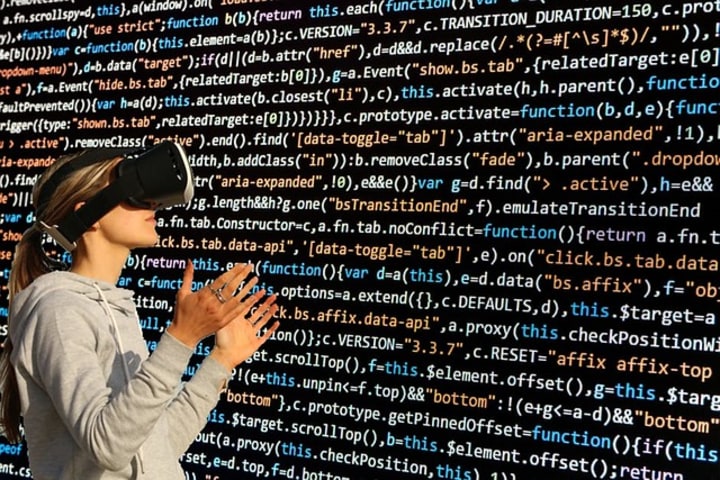
Virtual Reality (VR) technology has been around for several decades, but it has only recently become accessible to the general public. This new form of technology has revolutionized the way we experience entertainment and has opened up a world of new possibilities for the entertainment industry. In this article, we will explore the impact of VR on the entertainment industry and how it has changed the way we consume and interact with media.
Virtual Reality creates a completely immersive experience that allows the user to be transported to another world. It’s like being inside a video game, except the user is not just watching the action on a screen, but rather is physically inside the game. This level of immersion is achieved through the use of a headset that covers the user’s eyes and ears, and tracks their movements in real-time. The headset is equipped with sensors that allow the user to interact with their virtual surroundings, creating a more engaging and realistic experience.

The entertainment industry has embraced VR in a big way. From gaming to movies, VR has become a major player in the world of entertainment. One of the most popular applications of VR in the entertainment industry is gaming. VR gaming has taken the industry by storm, offering players the opportunity to fully immerse themselves in the game world. With VR, gamers can explore new environments, interact with characters and objects, and even engage in hand-to-hand combat. The level of immersion that VR provides has made it an incredibly popular choice for gamers, and has allowed for the creation of new and exciting games that were previously impossible to create.
In addition to gaming, VR has also made its mark on the film and television industry. VR allows movie-goers to experience films in a whole new way, providing them with a more immersive and interactive experience. With VR, films can now be experienced in a 360-degree environment, allowing the viewer to look around the virtual world and explore their surroundings. This opens up new possibilities for filmmakers, who can now create stories that are more interactive and engaging than ever before.
Another area where VR has had a major impact is in the field of education. With VR, students can now experience virtual field trips, visit historical landmarks, and explore new environments without ever leaving the classroom. VR provides students with a hands-on learning experience that is not only more engaging but also more effective than traditional methods.

Despite the many benefits of VR, there are also some challenges associated with this new technology. One of the biggest challenges is the cost of VR headsets, which can be quite expensive for consumers. This limits the number of people who can afford to use VR and may prevent the technology from reaching its full potential. Additionally, VR can cause discomfort for some users, such as nausea, headaches, and eye strain. This can be a major barrier to widespread adoption of VR, and developers are working to address these issues to make VR more accessible to everyone.
In conclusion, Virtual Reality has had a profound impact on the entertainment industry. It has opened up a world of new possibilities for gamers, filmmakers, and education professionals. However, there are also challenges associated with VR that need to be addressed, such as cost and user comfort. Despite these challenges, the future of VR looks bright, and we can expect to see even more exciting developments in this field in the years to come. As VR technology continues to evolve and improve, it will likely have an even greater impact on the entertainment industry and change the way we consume and interact with media.
One of the most significant benefits of VR is its ability to bring people together in a virtual space, regardless of their physical location. This has been particularly useful for the entertainment industry, as it allows for the creation of virtual concert experiences, live events, and interactive gaming tournaments. VR has provided a new platform for entertainment that transcends geographical boundaries, making it possible for people from all over the world to come together and experience the same virtual event.

VR has also had a significant impact on the film industry, as it offers a new platform for filmmakers to tell their stories. With VR, filmmakers can create more immersive and interactive experiences, allowing viewers to explore virtual environments, interact with characters and objects, and even influence the outcome of the story. This has opened up a whole new world of storytelling possibilities and has the potential to change the way we consume movies and television shows.
Another way VR is impacting the entertainment industry is by offering new opportunities for advertising and marketing. VR allows companies to create virtual experiences that showcase their products or services in an interactive and engaging way. This can be especially effective for industries such as real estate, where VR can be used to give potential buyers a virtual tour of properties before they visit in person. This can save time and resources for both the buyer and the seller, and can help to increase the chances of a successful sale.
In addition to its impact on the entertainment industry, VR also has the potential to revolutionize the way we work. With VR, remote teams can collaborate in virtual workspaces, allowing them to work together from anywhere in the world. This has the potential to make remote work more productive, efficient, and enjoyable, as well as provide new opportunities for people who are unable to work in traditional office environments.
Despite all of the benefits of VR, there are also some challenges that need to be addressed. One of the biggest challenges is the cost of VR hardware, which can be quite expensive for consumers. Additionally, there is a learning curve associated with VR, as users must learn how to interact with their virtual environment. This can be difficult for some people, especially for those who are not familiar with video games or other interactive media.
Another challenge with VR is the need for a large amount of processing power and high-quality graphics cards. This can make VR experiences slow and laggy, which can reduce the overall enjoyment and immersion of the experience. In addition, VR can cause discomfort for some users, such as nausea, headaches, and eye strain. This can be a major barrier to widespread adoption of VR, and developers are working to address these issues to make VR more accessible to everyone.
Despite these challenges, the future of VR in the entertainment industry looks bright. With continued advancements in technology, VR is likely to become more affordable and accessible, making it possible for more people to experience virtual reality. As VR becomes more mainstream, it will also create new opportunities for businesses, developers, and artists to create new and exciting VR experiences.
One of the most promising areas of VR is social VR, which allows people to connect and interact in virtual spaces. This technology has the potential to change the way we socialize and connect with others, offering new opportunities for people to meet and interact with others from around the world. This has already begun to happen, with virtual events and concerts becoming more popular, and social VR apps and platforms like VRChat and Rec Room becoming more widely used.
Another area of VR that is likely to grow in the future is location-based VR, which involves creating VR experiences that are available in specific locations. For example, theme parks and entertainment centers might offer VR experiences that allow visitors to enter virtual worlds and interact with others in real-time. This will create new and exciting opportunities for people to experience VR and will likely drive growth in the industry.
One of the most significant impacts of VR on the entertainment industry is that it has given consumers a new level of control and interactivity. With VR, viewers can experience media in a more immersive and interactive way, making it possible for them to become part of the story. This has created new opportunities for creative expression and has the potential to change the way we think about entertainment.
In conclusion, the impact of VR on the entertainment industry has been profound, and we can expect to see continued growth and innovation in this field. VR has opened up new possibilities for entertainment, providing a new platform for storytelling, advertising, and social interaction. With continued advancements in technology, VR has the potential to change the way we experience media and entertainment, and we can look forward to exciting new developments in the years to come.





Comments
There are no comments for this story
Be the first to respond and start the conversation.